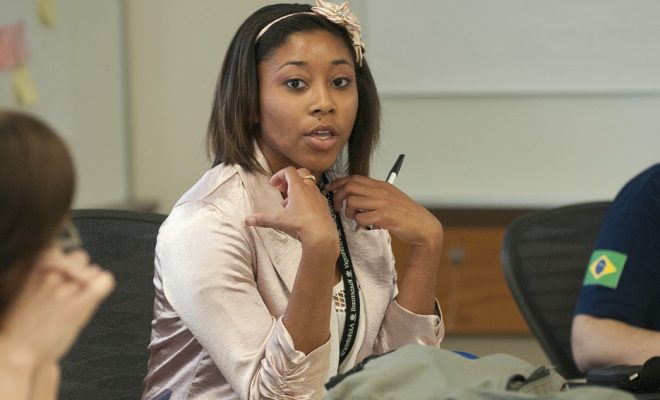Why boys need to have conversations about emotional intimacy in classrooms

Amy Schalet, University of Massachusetts Amherst
Last month, Tom Porton, an award-winning, veteran Bronx high school teacher, handed in his resignation after colliding with the school’s principal. Porton had distributed HIV/AIDS education fliers listing nonsexual ways of “Making Love Without Doin’ It” (including advice to “read a book together”).
What does it say when a teacher who encourages students to discuss nonsexual ways to express love causes controversy? And how do discussions at school about sex affect teenagers? Do adults lose teenagers’ trust when they are not allowed to speak frankly about how to create healthy intimacy?
My cross-national research on adolescent sexuality shows a profound discomfort in American society not just with teenage sex, but with teenage love. And the silence among adults that results – in families, schools and the culture at large – may take a particular toll on adolescent boys.
What does love have to do with it?
Political battles have raged for decades about whether and how public school students in the U.S. should be taught about condoms and other forms of contraception even though the majority of American youth lose their virginity during their teenage years.
The United States has seen more political strife and cultural controversy around adolescent sexuality than many other countries that went through a sexual revolution in the 1960s and ‘70’s. The Netherlands is an interesting comparative case: Like the U.S., Dutch society was culturally conservative in the 1950s. But Dutch society emerged from the sexual revolution with a more positive approach to adolescent sexuality, one that center-stages love.
American curricula tend to focus on physical acts and dangers – disease and pregnancy – often eschewing positive discussions of sexual pleasure or emotional intimacy.
Feminist scholars have critiqued American sex education for its overemphasis of danger and risk, noting the cost to teenage girls. Scholars have argued that the “missing discourse” of girls’ desire impedes their sense of power in and outside of relationships, leaving them poorly equipped to negotiate consent, safety and sexual satisfaction.
But scholars have paid less attention to the missing discourse of teenage love in American sex education, and its effects on boys, who confront a broader culture that provides scant recognition of, or support for, their emotional needs.

Discussion on teenage sexuality is lacking nonsexual ways to build intimacy. Joao Paulo de Vasconcelos, CC BY-SA
In comparison, sex education in the Netherlands tends to frame boys’ and girls’ sexual development in the context of their feelings for and relationships with others. Curricula include discussions of fun and exciting feelings. They also validate young people’s experience of love.
For example, the title of a widely used Dutch sex education curriculum is “Long Live Love, which is notable both for the celebration of sexual development, and for couching that development in terms of love.
Another example is of a PBS News Hour video, which shows a Dutch teacher engaging a group of 11-year olds in a conversation about what it feels like to be in love, and the proper protocol for breaking up (not via text message).
After watching the video, a male student at the University of Massachusetts spoke wistfully about what was missing from his own sex education experiences, stating, with a hint of outrage in his voice,
No one talks with us about love!
‘Dirty little boys, get away!’
The differences between American and Dutch sex education curricula reflect broader cultural differences in the ways adults talk about young people and their motivations.
In interviews I conducted with Dutch and American parents of high school sophomores, the Dutch parents spoke about teenage sexuality in the context of their children falling in love.
One Dutch mother recalled that her son was “interested in girlfriends at a very early age and then he was also often intensely in love.” Her son would not have been unusual. Ninety percent of Dutch 12- to 14-year-old boys, surveyed in a national study, reported that they had been in love.
By contrast, American parents were very skeptical of love during the teenage years. They attributed adolescent sexuality to biological urges – particularly with regard to boys. I found it to be so, across the political spectrum.
Parents portrayed boys as slaves to their hormones. One self-described liberal mother said,
Most teenage boys would fuck anything that would sit still.
A conservative father, who was anxious about his daughter’s dating, stated:
I’m a parent of a teenage cheerleader. I’m very concerned: “Dirty little boys! Get away! Get away!”
What do boys want?
I found that boys in both cultures are looking for intimacy and relationships, not only sex. But they differed in how much they believed they fit the norm.
The Dutch boys thought that their desire to combine sex with relationships was normal, whereas American boys tended to see themselves as exceptionally romantic.

What parents don’t know about teenage boys. Davidlohr Bueso, CC BY
Says Randy, an American boy I interviewed:
If you ask some guys, they’ll say it’s mainly for the sex or whatever [that they get together with a girl], but with me, you have to have a relationship with the person before you have sex with her…. I’d say I’m exceptional.
Randy is far from exceptional. In one U.S. survey, boys chose having a girlfriend and no sex over having sex and no girlfriend by two to one.
Other research too has shown American teenage boys – across racial and ethnic groups – crave intimacy, and are as emotionally invested as girls are in romantic relationships.
American boys end up paying a price for a culture that does not support their needs for intimacy. For the issue is that while boys crave closeness, they are expected to act as if they are emotionally invulnerable. Among the American boys I interviewed, I observed a conflict between their desires and the prevailing masculinity norms – if they admit to valuing romantic love, they risk being viewed as “unmasculine.”
Unrealistic and unfair expectations about boys’ lack of emotional vulnerability, in turn, make it harder for them to navigate both platonic and romantic relationships. One study found that as boys move through the teenage years, masculinity norms (beliefs that men should be tough and not behave in ways marked as “feminine”), particularly the stigma of homosexuality, make it harder to maintain close same-sex friendships, leaving boys lonely and sometimes depressed.
With less practice sustaining intimacy, boys enter romantic relationships less confident and less skilled. Ironically, many boys end up less prepared for, but more emotionally reliant on, heterosexual contacts.
Talk to us
When I asked my students to brainstorm about ideal sex education programs, based on research, they recommended focusing more on relationships. These young men suggested that having older boys mentor young boys, showing that it is normal for boys to value relationships could challenge the idea that it’s not masculine to need emotional closeness.
Certainly, such peer mentoring might go a long way to counteract the gender stereotypes and rigid masculinity norms that research has shown adversely affect boys’ sexual health.
The flyer Porton distributed invited an intergenerational conversation about emotional intimacy that is missing from most classrooms and boys’ lives. And it’s a conversation boys appear eager to have.
![]()
Amy Schalet, Associate Professor of Sociology, University of Massachusetts Amherst
This article was originally published on The Conversation. Read the original article.






